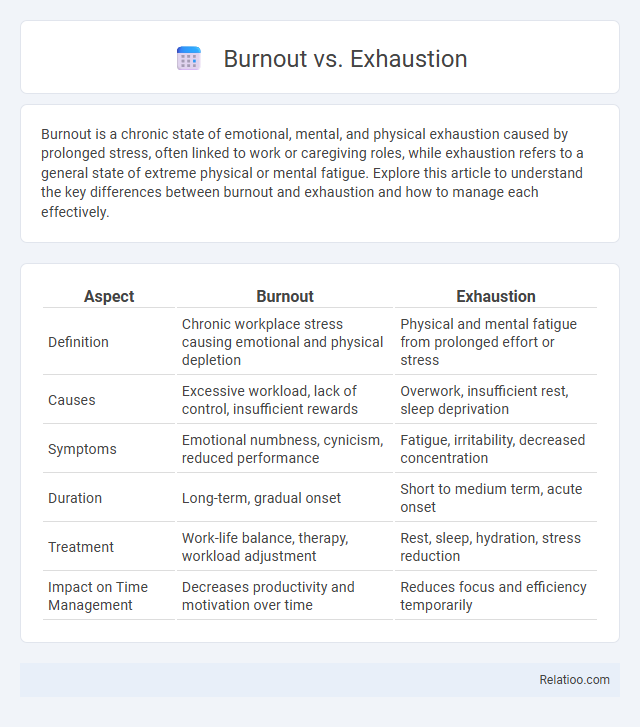Burnout is a chronic state of emotional, mental, and physical exhaustion caused by prolonged stress, often linked to work or caregiving roles, while exhaustion refers to a general state of extreme physical or mental fatigue. Explore this article to understand the key differences between burnout and exhaustion and how to manage each effectively.
Table of Comparison
| Aspect | Burnout | Exhaustion |
|---|---|---|
| Definition | Chronic workplace stress causing emotional and physical depletion | Physical and mental fatigue from prolonged effort or stress |
| Causes | Excessive workload, lack of control, insufficient rewards | Overwork, insufficient rest, sleep deprivation |
| Symptoms | Emotional numbness, cynicism, reduced performance | Fatigue, irritability, decreased concentration |
| Duration | Long-term, gradual onset | Short to medium term, acute onset |
| Treatment | Work-life balance, therapy, workload adjustment | Rest, sleep, hydration, stress reduction |
| Impact on Time Management | Decreases productivity and motivation over time | Reduces focus and efficiency temporarily |
Understanding Burnout and Exhaustion
Burnout is a chronic state of emotional, mental, and physical exhaustion caused by prolonged stress, often related to work or caregiving, characterized by feelings of cynicism, detachment, and reduced professional efficacy. Exhaustion refers specifically to the overwhelming fatigue and depletion of energy that can result from both physical exertion and mental strain, serving as a core component of burnout but also occurring independently. Understanding burnout requires recognizing that it encompasses more than just exhaustion, involving a complex interplay of emotional depletion, depersonalization, and diminished accomplishment.
Defining Burnout: Key Characteristics
Burnout is characterized by chronic workplace stress that has not been successfully managed, leading to emotional exhaustion, depersonalization, and a reduced sense of personal accomplishment. Unlike general exhaustion, burnout encompasses psychological symptoms such as cynicism and feelings of inefficacy, deeply impacting your motivation and performance. Understanding these key characteristics helps distinguish burnout from temporary tiredness or mere physical exhaustion.
Recognizing Symptoms of Exhaustion
Recognizing symptoms of exhaustion involves identifying persistent physical and emotional fatigue, difficulty concentrating, and irritability that hinder daily functioning. Your body may exhibit signs such as frequent headaches, muscle weakness, or disturbed sleep patterns, indicating severe energy depletion. Differentiating these symptoms from burnout or chronic stress is essential for timely intervention and effective recovery strategies.
Causes and Triggers: Burnout vs Exhaustion
Exhaustion primarily results from physical or mental fatigue after prolonged activity, while burnout stems from chronic workplace stress and emotional depletion. Causes of exhaustion include overwork, lack of sleep, and intense physical or cognitive effort, whereas burnout triggers involve sustained job dissatisfaction, high demands, and insufficient support. Understanding your symptoms and addressing these underlying causes can help prevent the progression from exhaustion to full burnout.
Psychological Impact: Comparing Both States
Burnout primarily affects mental well-being by causing feelings of chronic stress, reduced motivation, and emotional exhaustion, while exhaustion manifests physically and mentally, resulting in fatigue and impaired cognitive function. Psychological impact of burnout includes decreased job satisfaction, anxiety, and depression, with a prolonged effect on overall mental health. Both states disrupt emotional regulation and cognitive performance but burnout often involves a deeper sense of detachment and loss of purpose compared to general exhaustion.
Physical Signs: How the Body Responds
Physical signs differentiate burnout, exhaustion, and fatigue, with burnout often presenting as chronic fatigue, muscle tension, and frequent headaches due to prolonged stress. Exhaustion typically manifests as overwhelming physical weakness, slower reflexes, and persistent tiredness that hinders daily activities. Your body's response to these conditions includes increased heart rate, disrupted sleep patterns, and compromised immune function, signaling the need for rest and recovery.
Work-Related Factors Influencing Burnout and Exhaustion
Work-related factors influencing burnout and exhaustion include excessive workload, lack of control over tasks, and insufficient workplace support. Prolonged exposure to high job demands combined with low autonomy significantly increases the risk of burnout, characterized by emotional depletion and reduced performance. In contrast, exhaustion primarily results from physical and mental fatigue due to sustained stress without adequate recovery time.
Effective Prevention Strategies
Effective prevention strategies for burnout, exhaustion, and fatigue include setting clear boundaries to manage workload and ensuring regular breaks to recharge mental and physical energy. Prioritizing stress management techniques such as mindfulness, adequate sleep, and physical activity can significantly reduce the risk of chronic burnout and exhaustion. You can enhance your resilience by seeking social support and professional help when early signs of these conditions appear.
Recovery Techniques for Each Condition
Recovering from burnout requires prioritizing long-term lifestyle changes such as improving sleep quality, setting clear boundaries, and engaging in meaningful activities that restore purpose and motivation. Exhaustion recovery focuses on immediate rest and physical recuperation, including hydration, nutritious meals, and short-term breaks to restore energy levels quickly. Your mental health benefits from tailored strategies: burnout demands stress management and professional support, exhaustion calls for physical recovery, and addressing chronic fatigue syndrome involves comprehensive medical care and gradual activity pacing.
When to Seek Professional Help
Recognizing the signs of burnout, exhaustion, and chronic stress is crucial for timely intervention and mental health preservation. Seek professional help when persistent fatigue disrupts daily functioning, emotional numbness intensifies, or physical symptoms such as headaches and insomnia prolong beyond typical recovery periods. Early consultation with a mental health specialist can provide targeted strategies to manage symptoms and prevent escalation into more severe psychological conditions.

Infographic: Burnout vs Exhaustion
 relatioo.com
relatioo.com